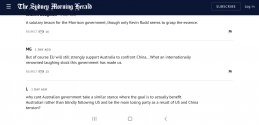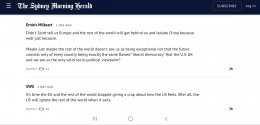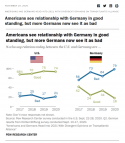Think tankers like Barkin understand Merkel's anxiety towards U.S. internal politics yet on Twitter never empathize with her concern.China closed out the year 2020 with a bang, with the completion of China-EU The Comprehensive Agreement on Investment (CAI). There is no doubt Germany has played the leading role to get this agreement completed by the year end and, Ms. Merkel clearly has been the driving force. It's quite notable that Germany has staked out a position that is not aligned with Anglo's black-and-white world-view when it comes to China and Russia, as shown in the cases of Huawei and Nord Stream 2.
This article from Foreign Policy provides some background on Merkel's thinking behind all her China policy. The author is clearly frustrated with her policies. He held out hope for a change in Germany's China policy when Merkel will leave the office this year.
Europe’s year-end investment deal with Beijing is a clear window into the German chancellor’s foreign-policy worldview.
BY | DECEMBER 31, 2020, 2:46 AM
Last year, I asked a diplomat who had worked closely with Angela Merkel for many years to sum up the German leader’s views on China. I was expecting to hear a list of concerns about the country’s authoritarian tilt under Xi Jinping, the plight of the Uighurs, and the role of the state in the Chinese economy.
Instead, the diplomat talked about Merkel’s admiration for China’s economic achievements and her appreciation of the role Beijing had played during Europe’s financial crisis a decade ago, when China bought the bonds of ailing eurozone member states and provided a market in which German firms could continue to thrive. “She has not forgotten this,” I was told.
I was reminded of this conversation in recent weeks as news emerged that Merkel, now in her 16th and final year as chancellor, was pushing other EU member states to approve a major .
The timing of the deal, after a year of escalating tensions between Europe and China and just weeks before the inauguration of U.S. President-elect Joe Biden, to say the least. It is hard not to view it as a geopolitical gift to Beijing and slap in the face to an incoming Biden administration that has vowed to repair trans-Atlantic ties and work more closely with Europe on the strategic challenges posed by China.
But to those who have followed Merkel and her approach to China over the years, the rush to seal a deal with Beijing comes as no surprise. Just a week before news from the investment talks broke, her cabinet approved a draft law that—against the tide in Europe—could open the door for Huawei to play a role in Germany’s 5G network. The law is the culmination of a two-year tussle in which Merkel doggedly resisted pressure from members of her own party, her Social Democrat coalition partners, German intelligence agencies, and key allies, including the United States, to keep Huawei out.
I have heard many theories about why a leader who has a reputation for moral integrity and who grew up under a repressive East German regime that rose from the devastation left by the Nazis continues to embrace China as a partner even as it locks up its Muslim minority in camps and builds a digital surveillance state that would shame the Stasi.
Most of them begin and end with the economic argument: that Germany and its biggest companies are simply too dependent on China for Berlin to risk alienating the Communist Party leadership in Beijing. This is certainly a factor in Merkel’s thinking, as the German diplomat’s comments make clear.
For German carmakers, China is both the present and the future. This year alone, they have invested billions of euros in in China. Other German companies, such as the chemicals group BASF, are also doubling down on the vast Chinese market, ignoring talk of decoupling and betting on an economy that has bounced back faster and stronger than others from COVID-19. If you forced Germany’s biggest firms to choose between China and the United States right now, many would pick China, despite concerns about the hand of the Communist Party in the economy.
But the economic argument alone is insufficient to explain Merkel’s positioning on China. There is also a geopolitical dimension that often gets lost in the discussion.
In a series of speeches over the past few years, Merkel has made clear that she sees Germany as highly vulnerable in a more hostile world of great-power competition. The conclusion she draws from this is that Berlin cannot afford to get on the wrong side of Beijing at a time when its weight, influence, and reach seem bound to increase.
At the in early 2019, Merkel plaintively described Germany’s prospects in this new geopolitical landscape as “poor.” A year later, in a speech at the in Berlin, she talked extensively about Europe’s geographic vulnerabilities. “If you look at what we Europeans have on our doorstep, it looks quite challenging,” she said. “We have Russia and right after that China. China and Russia are moving closer.”
The authoritarians to the east might not be a problem if Europe could count on the United States. But Merkel has also come to the conclusion that Washington is no longer a reliable partner. This is a theme that she touched on in a back in 2017, following the first in a series of disastrous NATO and G-7 summits with Donald Trump. But the past years have only reinforced this view.
Trump did lose to Biden in November. But the number that truly reverberated in Berlin, I am told, was not the 306 electoral votes that put Biden over the top but the 74.2 million votes that Trump received. Trump may soon be gone, but his followers are here to stay. It is only a matter of time before someone else takes up his nativist battle cry. Against this backdrop, the only responsible path forward, in Merkel’s view, is to hedge.
Finally, Merkel sees Germany as a mediating force in the escalating confrontation between the United States and China. Her push to reengage with Beijing on the investment agreement, climate change, and other areas this year was an attempt to show that dialogue with the Chinese leadership still makes sense. In her view, attempts to isolate and contain China can only lead to disaster.
In an increasingly black-and-white world where liberal democracies face an existential challenge from authoritarians and populists, Merkel still sees gray—and not only with China. The bargain she brokered recently with democratic backsliders Hungary and Poland to avert a clash over the EU budget is another example. George Soros accused her of .
Merkel’s approach to China no longer reflects the consensus in Germany or in Europe, where positions have hardened substantially over the past year. Some 71 percent of Germans now have a negative view of China, according to a Pew Research Center published in October. And Merkel can expect political pushback against her plans for the EU-China investment deal.
No one can predict where Germany will come down on China when she leaves the political stage next year. Much will depend on who replaces her, the makeup of the next German government, and how Beijing and the Biden administration position themselves. But Merkel’s own is already set in stone. The history books may not be kind.
Noah Barkin is a managing editor at the Rhodium Group and senior visiting fellow at the German Marshall Fund of the United States.
Hawley's latest drama does not help to promote American's institutional resilience that they should have.




